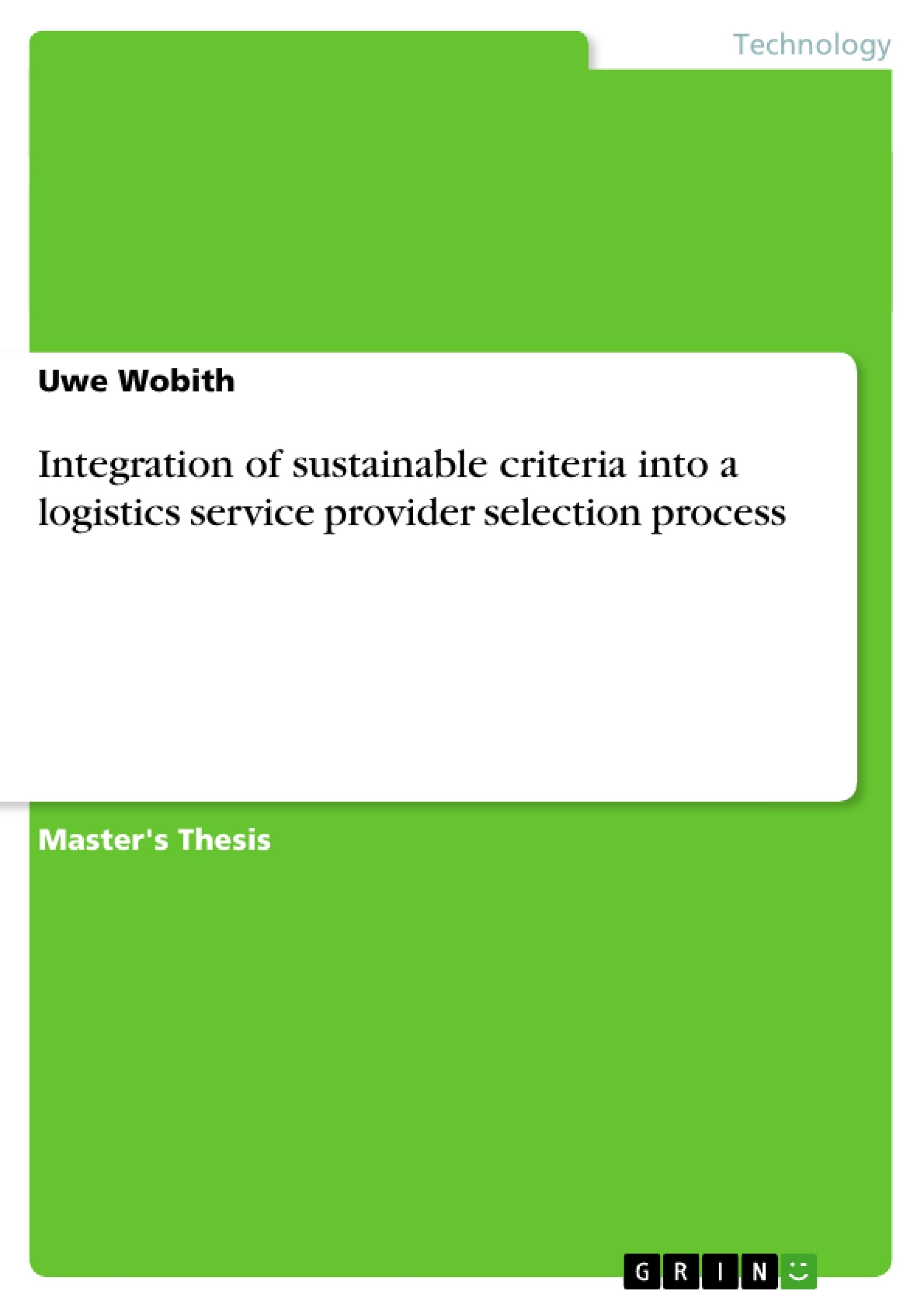The need for the integration of sustainability into Supply Chain Management has constantly increased over the last years. The simultaneous rise of the relevance of outsourcing of logistics activities emphasizes the need to put strong attention to sustainable aspects in the relationship between shippers and their logistics service providers (LSP). This thesis strives to answer the question how sustainability can be integrated into the LSP procurement process.
Thereto, a broad literature review is compiled by applying all relevant references into a comprehensive framework. One of the main revealed challenges of sustainable LSP procurement is the lack of overview on sustainable selection criteria.
In order to overcome this gap, a multi-dimensional model will be presented to improve comparability and organization of criteria by assigning them to a sustainable dimension, field of activity, field of action and time/ planning horizon. The following research on existing sustainable selection criteria results in a long list with 123 criteria. The statistical analyses of this list provide insights into current research directions on sustainability and both approve assumptions and unveil mismatches from the existing body of literature.
The development of an expert guidance based on the catalogue of sustainable selection criteria offers practical applications to foster the integration of sustainability into LSP-shipper relationships. It provides assistance for LSP procurement decisions of transportation and warehousing as well as for evaluation of sustainable certification standards.
Although the presented criteria catalogue offers an opportunity to compare different selection criteria by counting the number of contributions mentioning a specific criterion, quantitative measurability of sustainable selection criteria remains one of the most important open challenges.
Inhaltsverzeichnis (Table of Contents)
- Abstract
- Zusammenfassung
- 摘要
- 1 Introduction
- 2 Literature Review
- 2.1 Sustainable Supply Chain Management
- 2.2 Logistics Service Providers (LSP)
- 2.3 Sustainable Procurement of LSPs
- 2.4 Sustainable Selection Criteria for LSPs
- 3 Sustainable Selection Criteria Model
- 4 Development of a Sustainable Selection Criteria Catalogue
- 5 Statistical Analysis of Sustainable Selection Criteria
- 6 Expert Guidance for LSP Procurement
- 6.1 Selection of relevant Criteria
- 6.2 Evaluation of Sustainable Certification Standards
- 7 Conclusion and Outlook
Zielsetzung und Themenschwerpunkte (Objectives and Key Themes)
This thesis examines the integration of sustainability into the logistics service provider (LSP) procurement process. It addresses the challenge of a lack of overview on sustainable selection criteria by developing a multi-dimensional model to improve the comparability and organization of such criteria. Through a comprehensive literature review and statistical analysis, the thesis explores existing sustainable selection criteria, identifies current research directions on sustainability, and highlights areas where further research is needed. The main themes of this work are:- Integration of Sustainability into Supply Chain Management
- Procurement of Logistics Service Providers (LSPs)
- Sustainable Selection Criteria for LSPs
- Developing a Multi-Dimensional Model for Sustainable Selection Criteria
- Statistical Analysis of Sustainable Selection Criteria and Identification of Research Gaps
Zusammenfassung der Kapitel (Chapter Summaries)
- Chapter 1 provides an introduction to the topic of sustainable LSP procurement, highlighting the growing need for sustainability in the logistics sector and the increasing prevalence of logistics outsourcing. It outlines the research question and the structure of the thesis.
- Chapter 2 presents a comprehensive literature review, examining the concepts of sustainable supply chain management, LSPs, sustainable procurement of LSPs, and sustainable selection criteria for LSPs. This chapter reveals the challenge of a lack of overview on existing sustainable selection criteria.
- Chapter 3 introduces a multi-dimensional model for classifying sustainable selection criteria, organizing them into four dimensions: sustainability area, field of activity, field of action, and time/planning horizon. This model aims to improve comparability and organization of criteria.
- Chapter 4 focuses on the development of a catalogue of sustainable selection criteria for LSPs, resulting in a list of 123 criteria based on a thorough analysis of existing research. This chapter provides a comprehensive resource for practitioners and researchers interested in sustainable LSP procurement.
- Chapter 5 presents a statistical analysis of the developed criteria catalogue, revealing trends and imbalances in current research on sustainability. The analysis provides insights into areas where research is needed and helps to guide further development of sustainable selection criteria.
- Chapter 6 discusses the development of expert guidance based on the catalogue of sustainable selection criteria, offering practical applications for LSP procurement decisions. It explores the selection of relevant criteria for transport and warehousing services and the evaluation of sustainable certification standards.
Schlüsselwörter (Keywords)
This thesis focuses on the intersection of Supply Chain Management, logistics service providers, sustainability, and procurement. It explores the development and application of sustainable selection criteria for LSPs, emphasizing the importance of a multi-dimensional framework for organizing and comparing criteria. Key concepts include: sustainable supply chain management, sustainable procurement, sustainable selection criteria, logistics service provider selection, and expert guidance for LSP procurement.Frequently Asked Questions
How can sustainability be integrated into the LSP procurement process?
The thesis proposes a multi-dimensional model and a catalogue of 123 selection criteria to evaluate the sustainability of logistics service providers.
What are the main challenges in sustainable LSP selection?
The lack of a comprehensive overview of criteria and the difficulty in quantitative measurability of sustainable criteria are major hurdles.
What is the "Sustainable Selection Criteria Model"?
It is a model that organizes criteria into four dimensions: sustainable area, field of activity, field of action, and planning horizon.
How many sustainable selection criteria were identified?
The research resulted in a comprehensive long list of 123 specific sustainable selection criteria based on existing literature.
What practical assistance does the thesis offer for shippers?
It provides an expert guidance for procurement decisions in transportation and warehousing, as well as an evaluation of sustainable certification standards.
- Quote paper
- Uwe Wobith (Author), 2013, Integration of sustainable criteria into a logistics service provider selection process, Munich, GRIN Verlag, https://www.grin.com/document/233540



